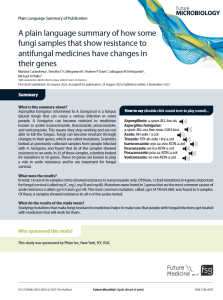Plain language summary: A. fumigatus fungi samples that show resistance to antifungal medicines have changes in their genes
 This Plain Language Summary of Publication article from Future Microbiology looks at a fungus, that can cause serious infection, called Aspergillus fumigatus (shortened to A. fumigatus). The fungus can become resistant to medicines known as azoles. The study that is summarised here analysed mutations (changes in genes) that make fungi resistant to medicines, this information can ensure that people with fungal infections get treated with medicines that will work for them.
This Plain Language Summary of Publication article from Future Microbiology looks at a fungus, that can cause serious infection, called Aspergillus fumigatus (shortened to A. fumigatus). The fungus can become resistant to medicines known as azoles. The study that is summarised here analysed mutations (changes in genes) that make fungi resistant to medicines, this information can ensure that people with fungal infections get treated with medicines that will work for them.
Visit the Future Medicine site using the link to read the article.
The original article on which this summary is based is called ‘Isavuconazole nonwildtype Aspergillus fumigatus isolates from a global surveillance study display alterations in multiple genes involved in the ergosterol biosynthesis pathway not previously associated with resistance to other azoles’ and was published in Mycoses.
Visit the Wiley Online Library site using the link to read the article.
